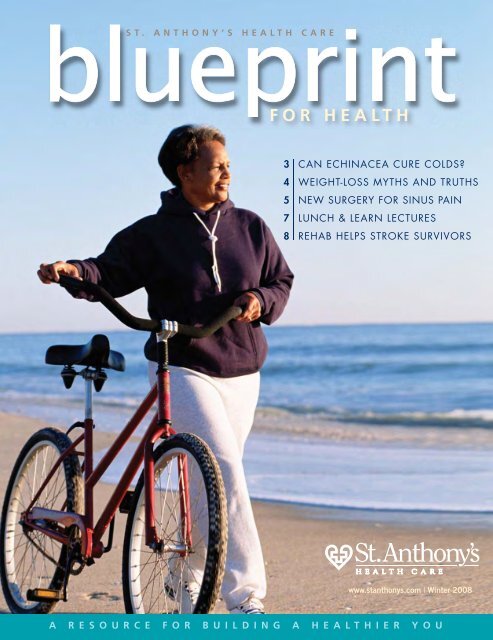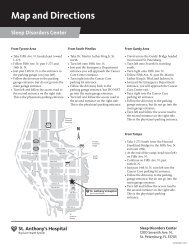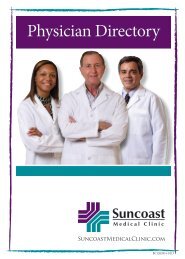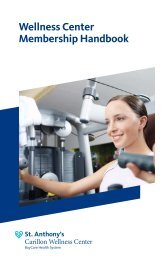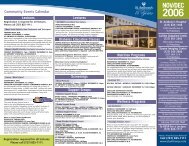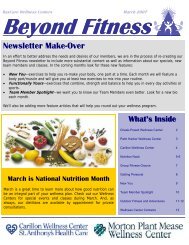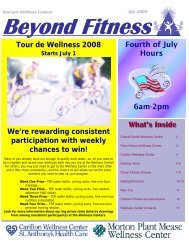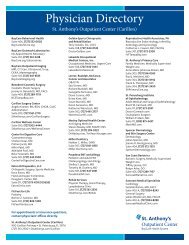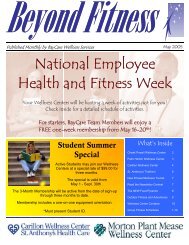2008 winter - Blueprint for Health magazine - St. Anthony's Hospital
2008 winter - Blueprint for Health magazine - St. Anthony's Hospital
2008 winter - Blueprint for Health magazine - St. Anthony's Hospital
You also want an ePaper? Increase the reach of your titles
YUMPU automatically turns print PDFs into web optimized ePapers that Google loves.
ST. ANTHONY’S HEALTH CARE<br />
FOR HEALTH<br />
3 CAN ECHINACEA CURE COLDS?<br />
4 WEIGHT-LOSS MYTHS AND TRUTHS<br />
5 NEW SURGERY FOR SINUS PAIN<br />
7 LUNCH & LEARN LECTURES<br />
8 REHAB HELPS STROKE SURVIVORS<br />
www.stanthonys.com | Winter <strong>2008</strong><br />
A RESOURCE FOR BUILDING A HEALTHIER YOU
INSIDE THIS ISSUE<br />
page 2 | Managing Medicines<br />
During Cold and Flu Season<br />
page 3 | Echinacea: Cure-All <strong>for</strong><br />
the Common Cold?<br />
page 4 | Weight-Loss Myths<br />
and Truths<br />
page 4 | Yes, You Can<br />
<strong>St</strong>rengthen Your Willpower!<br />
page 5 | Sinus Pain? New<br />
Surgery Could Mean Relief<br />
page 6 | Recipe <strong>for</strong> <strong>Health</strong>:<br />
Baked Trout<br />
page 6 | Catch All the Benefits<br />
of Fish<br />
page 7 | Community Events<br />
Calendar<br />
page 8 | Rehab Helps <strong>St</strong>roke<br />
Survivors<br />
page 8 | Should a “Mini-<strong>St</strong>roke”<br />
Be a Major Concern?<br />
Message from the President<br />
of <strong>St</strong>. Anthony’s <strong>Health</strong> Care<br />
I<br />
am excited to start the New Year! <strong>St</strong>.<br />
Anthony’s <strong>Health</strong> Care begins <strong>2008</strong><br />
by taking a look at our future role as a<br />
hospital. While every hospital’s focus is to<br />
serve the sick and injured, <strong>St</strong>. Anthony’s is<br />
so much more. Our expert physicians and<br />
nurses provide you with education on disease<br />
prevention, as well as the latest treatments<br />
and technologies in health care. We are<br />
honored to share our resources with you, the<br />
community, and we encourage you and your<br />
family members to make a commitment in<br />
this New Year to live a healthier lifestyle.<br />
This first issue of the New Year offers<br />
great tips on how you can implement new<br />
health programs into your lifestyle. On Page<br />
4, we explore weight-loss myths and facts.<br />
You can read Page 5 to learn about sinus<br />
care and how one physician is per<strong>for</strong>ming<br />
minimally invasive surgical procedures<br />
to benefit patients with sinus problems.<br />
For additional resources, Page 7 lists our<br />
calendar of events and several lectures and<br />
programs to further guide you along your<br />
path to wellness.<br />
I wish you good health<br />
and a Happy New Year!<br />
William Ulbricht<br />
President of <strong>St</strong>.<br />
Anthony’s <strong>Health</strong><br />
Care<br />
SAVE THE DATE!<br />
LEGACY DINNER AND MEDALLION GALA<br />
LEGACY DINNER<br />
Join us as we honor loyal friends and<br />
donors of <strong>St</strong>. Anthony’s <strong>Health</strong> Care<br />
Foundation.<br />
Tuesday, February 5<br />
Renaissance Vinoy Resort<br />
7 TH ANNUAL MEDALLION GALA —<br />
A NIGHT IN THE TROPICS<br />
This “Night in the Tropics” will benefi t<br />
the renovation and expansion of the<br />
Emergency Department at <strong>St</strong>. Anthony’s<br />
<strong>Hospital</strong>.<br />
Friday, May 9<br />
Renaissance Vinoy Resort<br />
Sponsorship opportunities <strong>for</strong> each event are available. For more in<strong>for</strong>mation, please call<br />
the Foundation at 727-825-1086.<br />
2 www.stanthonys.com
Managing Medicines:<br />
How to <strong>St</strong>ay Safe During<br />
Cold and Flu Season<br />
Cold and flu season is<br />
upon us! To relieve<br />
symptoms, many people<br />
count on products such as Tylenol,<br />
Panadol and Feverall — all<br />
of which contain the medicine<br />
“acetaminophen.” As with all<br />
kinds of medicine, it’s important<br />
to keep safety in mind whenever<br />
you take this common drug.<br />
FOLLOW RECOMMENDED DOSES<br />
Acetaminophen is used to relieve<br />
mild to moderate pain and to<br />
reduce fever. When used properly,<br />
it can be safe and effective. But<br />
overdoses can be fatal. And, taking<br />
low doses of acetaminophen<br />
every day <strong>for</strong> several months can<br />
cause serious liver and kidney<br />
problems. To be safe, always<br />
follow the instructions on your<br />
medicine’s label and never exceed<br />
the recommended daily dose.<br />
AVOID AN OVERDOSE<br />
Accidental overdoses of acetaminophen<br />
can occur when<br />
people do not realize that a<br />
medicine they are taking contains<br />
acetaminophen or that they<br />
have taken two or more products<br />
containing acetaminophen at the<br />
same time.<br />
To stay safe, follow the<br />
recommended dose: 1,000 mg of<br />
acetaminophen every 6 hours, <strong>for</strong><br />
a total of 4 grams per day. If you<br />
have kidney or liver problems,<br />
ask your doctor or pharmacist<br />
what’s right <strong>for</strong> you.<br />
SAFETY TIPS<br />
To make it through cold and flu<br />
season safely, follow these tips:<br />
• Always read labels. The chart<br />
to the right shows examples of<br />
common medicines that contain<br />
acetaminophen.<br />
• Ask your doctor or pharmacist<br />
about the ingredients in your<br />
prescriptions and whether your<br />
prescriptions could interact with<br />
your cold or flu medicine.<br />
• If acetaminophen doesn’t<br />
improve your symptoms, don’t take<br />
more. Instead, consult your doctor.<br />
• Remember to provide a<br />
complete list of all medications<br />
you are taking to all of your<br />
health care providers.<br />
• Get a flu shot each fall. •<br />
Examples of Prescription Products<br />
Containing Acetaminophen:<br />
Acetaminophen<br />
Product Name<br />
per Tablet/Capsule<br />
Vicodin, Esgic Plus, Lortab, Tylox, Percocet<br />
7.5/500, Endocet 7.5/500, Roxicet<br />
Darvocet-N 100, Percocet 10/650,<br />
Endocet 10/650, Lorcet Plus<br />
Vicodin HP<br />
Vicodin ES<br />
500 mg<br />
650 mg<br />
660 mg<br />
750 mg<br />
Examples of Over-the-Counter<br />
Products Containing Acetaminophen:<br />
Product Name<br />
Actifed Cold & Sinus Maximum<br />
<strong>St</strong>rength, Midol Pre-Menstrual Syndrome,<br />
Excedrin Tension Headache,<br />
Tylenol PM Extra <strong>St</strong>rength<br />
TheraFlu Daytime Severe Cold Hot<br />
Liquid<br />
TheraFlu Flu & Chest Liquid<br />
Acetaminophen<br />
per Tablet/Capsule<br />
500 mg<br />
650 mg<br />
(per packet)<br />
1,000 mg<br />
(per packet)<br />
ECHINACEA: CURE-ALL FOR THE COMMON COLD?<br />
Some studies show that echinacea can<br />
reduce the length and severity of a<br />
cold. But one study says this popular<br />
herb may have no effect on a cold —<br />
or its symptoms.<br />
About 70 college-aged women and<br />
men agreed to take an echinacea<br />
supplement. The participants took six<br />
1-gram doses of the herb on the first<br />
day cold symptoms appeared. Then,<br />
they took three 1-gram doses per day<br />
<strong>for</strong> up to 10 days. Another group of<br />
about 70 young adults followed this<br />
exact pattern, but used a placebo<br />
instead.<br />
Both groups had colds <strong>for</strong> the same<br />
length of time: about two to 10 days.<br />
There also was no difference in the<br />
severity of their cold symptoms.<br />
The researchers concluded that the<br />
dried mixture of unrefined echinacea<br />
they tested had no benefits. However,<br />
they also noted that another echinacea<br />
preparation may have different<br />
results — and further studies of the<br />
herb are needed.<br />
Annals of Internal Medicine, Vol. 137, No. 12<br />
<strong>Blueprint</strong> <strong>for</strong> <strong>Health</strong> | Winter <strong>2008</strong><br />
3
Weight-Loss Myths and Truths<br />
When it comes to losing weight,<br />
it is often tough to separate fact<br />
from fiction. Are these myths<br />
sabotaging your weight-loss ef<strong>for</strong>ts?<br />
MYTH: I should avoid carbohydrates to<br />
shed pounds.<br />
FACT: Low-carb diets can lead to shortterm<br />
weight loss. “This is caused by the<br />
water weight you can lose on these diets,”<br />
explains Greg Gulick, D.O., M.P.H., an<br />
internist with <strong>St</strong>. Anthony’s Primary Care.<br />
“You regain this water weight quickly when<br />
you return to a normal carbohydrate diet.”<br />
What’s more, over the long term these<br />
diets put you at risk <strong>for</strong> heart disease. This<br />
is because they allow you to consume high<br />
amounts of protein and fat and are usually<br />
high in cholesterol. “Low-fat, high-carb<br />
diets are better <strong>for</strong> permanent weight loss<br />
— and your heart,” says Dr. Gulick.<br />
MYTH: For my diet, the types of food I eat<br />
are more important than the calories.<br />
FACT: The total calories you eat determines<br />
your dieting success — not how much fat,<br />
carbohydrate and protein you consume.<br />
To lose weight, Dr. Gulick suggests the<br />
following:<br />
• Eat healthy foods you enjoy.<br />
• Trim your portions.<br />
• Eat less fat and sugar.<br />
• Pick a diet that helps you lose about a<br />
pound a week. Most weight-loss diets allow<br />
you to consume 1,000 to 1,500 calories<br />
per day.<br />
MYTH: I really don’t need to exercise to<br />
lose weight.<br />
FACT: You can lose weight just from cutting<br />
calories, but it’s best to exercise, too.<br />
“Dieting alone can slow down how fast<br />
your body burns calories. Exercise can<br />
help prevent that,” says Dr. Gulick. “In<br />
fact, working out is very important to keep<br />
weight from returning.”<br />
When diet, exercise, and diet and<br />
exercise in combination were studied in one<br />
trial, all led to weight loss. The combination<br />
approach resulted in the most weight loss,<br />
but the exercise-only method kept the<br />
weight off longer. •<br />
LOSING ONLY 10 PERCENT OF<br />
YOUR CURRENT WEIGHT WILL HELP<br />
LOWER YOUR RISK FOR DISEASE.<br />
<strong>St</strong>. Anthony’s Primary Care Weight<br />
Loss Program is designed to help<br />
people achieve healthy weight-loss<br />
management by providing education<br />
and lifestyle counseling. The program<br />
includes:<br />
• Complete medical and dietary<br />
history<br />
• Complete physical exam<br />
• EKG testing and interpretation<br />
• Laboratory tests<br />
• Consultation with dietitians,<br />
exercise and behavioral counselors<br />
• Individualized education on<br />
nutrition, fitness and behavior<br />
modification<br />
START LOSING WEIGHT TODAY!<br />
Call the <strong>St</strong>. Anthony’s Primary Care<br />
Weight Loss Program at 727-561-<br />
0912.<br />
YES, YOU CAN STRENGTHEN YOUR WILLPOWER!<br />
Is your New Year’s resolution to exercise more or lose weight?<br />
The key to changing your habits may be to bolster your willpower.<br />
Here’s how:<br />
SET AN ACHIEVABLE GOAL. If you’re committed to exercising<br />
more, start by simply walking <strong>for</strong> 10 minutes a day or parking<br />
your car farther away in the parking lot.<br />
REWARD YOURSELF. After reaching a goal, treat yourself to a<br />
massage, book or CD.<br />
DO JUST ONE DIFFICULT THING AT A TIME. For example, people<br />
who try to quit smoking while also controlling alcohol use and<br />
overeating stack the odds against themselves, according to the<br />
journal American Psychologist.<br />
ANTICIPATE MINOR SLIPS. Plan <strong>for</strong> situations in which you will<br />
be tempted to stop exercising or eating healthfully, and<br />
determine what you’ll do instead.<br />
GIVE YOURSELF A MENTAL BOOST. Keep reminding yourself<br />
how well you are doing with your ef<strong>for</strong>ts.<br />
MONITOR YOUR PROGRESS. It’s a tactic used by successful<br />
dieters and <strong>for</strong>mer drinkers and smokers.<br />
4 www.stanthonys.com
Sinus Pain? New Surgery Could Mean Relief<br />
If it feels like your cold has dragged<br />
on <strong>for</strong> months, it may be time to see a<br />
doctor. That’s because your symptoms<br />
may signal a more serious condition called<br />
chronic rhinosinusitis. Thankfully, there is<br />
help. Physicians at <strong>St</strong>. Anthony’s <strong>Hospital</strong><br />
are well-poised to manage sinus ailments.<br />
And they often are able to successfully<br />
resolve the problem — even if previous<br />
treatments have not worked.<br />
Donald Lanza, M.D., an ear, nose and<br />
throat specialist on staff at <strong>St</strong>. Anthony’s,<br />
has gained worldwide recognition as an innovator<br />
of surgical procedures <strong>for</strong> the nasal<br />
passages and sinuses. Because of his developmental<br />
work, many minimally invasive<br />
procedures to correct chronic rhinosinusitis<br />
are in use today.<br />
“More than 30 million people in the<br />
United <strong>St</strong>ates suffer from chronic rhinosinusitis,<br />
many of them needlessly,” explains<br />
Dr. Lanza. “When other treatment options<br />
fail, endoscopic surgery has shown remarkable<br />
results. We have worked to fine-tune<br />
minimally invasive techniques and have<br />
enjoyed tremendous success.”<br />
tibiotics may be prescribed if the problem<br />
stems from a bacterial infection. If these<br />
therapies don’t work by themselves, surgery<br />
may be an option that can improve their<br />
effectiveness.<br />
MINIMALLY INVASIVE SINUS SURGERY<br />
Dr. Lanza uses a technique called functional<br />
endoscopic sinus surgery (FESS) to<br />
unblock nasal passages and improve sinus<br />
drainage. This minimally invasive, outpatient<br />
procedure usually is done entirely<br />
through the nostrils. Unlike earlier sinus<br />
surgery techniques, FESS means:<br />
• Less scarring<br />
• Reduced pain<br />
• A quicker recovery<br />
FESS is per<strong>for</strong>med using an endoscope<br />
— a thin tube that contains a bright light<br />
and magnifying lens — to examine the<br />
sinus and nasal openings. Once a blockage<br />
is located, the surgeon can correct the<br />
blockage and remove any polyps.<br />
Sinus surgery is generally very safe. But<br />
it doesn’t work <strong>for</strong> everyone. Fortunately,<br />
the extensive expertise at <strong>St</strong>. Anthony’s<br />
means a high success rate <strong>for</strong> patients.<br />
“If you’ve had sinus surgery that failed or<br />
have sinus problems that aren’t improving,<br />
we may be able to help,” says Dr. Lanza.<br />
“It can change your life.” •<br />
IF YOU SUFFER FROM CHRONIC<br />
SINUS PAIN, Dr. Lanza’s minimally<br />
invasive surgery could help. Learn<br />
about your treatment options. For a<br />
physician referral, call 727-825-1111.<br />
UNDERSTANDING CHRONIC<br />
RHINOSINUSITIS<br />
Chronic rhinosinusitis is characterized by inflamed<br />
membranes in the nose and sinuses.<br />
The inflammation thickens membrane walls,<br />
making it difficult <strong>for</strong> the sinuses to drain.<br />
In some people, nasal polyps — grape-like<br />
growths in the nasal passages — also block<br />
drainage and air flow.<br />
Chronic rhinosinusitis is very similar to<br />
acute sinusitis. Symptoms are generally<br />
the same. However, chronic rhinosinusitis<br />
lasts much longer — three months or<br />
more, compared with two to four weeks.<br />
Symptoms include:<br />
• Facial pain<br />
• Headache<br />
• Cough<br />
• Thick nasal drainage that is yellow or green<br />
Experts don’t know exactly what causes<br />
chronic rhinosinusitis, but it’s linked to<br />
allergies and asthma as well as infection.<br />
The condition often is treated with steroid<br />
nose sprays if it’s related to allergies. An-<br />
<strong>Blueprint</strong> <strong>for</strong> <strong>Health</strong> | Winter <strong>2008</strong><br />
5
Recipe <strong>for</strong> <strong>Health</strong><br />
BAKED TROUT<br />
Try baking this fish with only a<br />
small amount of oil.<br />
2 lbs. trout fillet, cut into six<br />
pieces (or use any kind<br />
of fish)<br />
3 tbsp. lime juice (about two<br />
limes)<br />
1 medium tomato,<br />
chopped<br />
1/2 medium onion,<br />
chopped<br />
3 tbsp. cilantro, chopped<br />
1/2 tsp. olive oil<br />
1/4 tsp. black pepper<br />
1/4 tsp. salt<br />
1/4 tsp. red pepper (optional)<br />
1. Preheat oven to 350° F.<br />
2. Rinse fish and pat dry.<br />
Place in baking dish.<br />
3. In a separate dish, mix remaining<br />
ingredients together<br />
and pour over fish.<br />
4. Bake <strong>for</strong> 15 to 25 minutes or<br />
until <strong>for</strong>k-tender.<br />
Serving size: 1 piece<br />
Yield: 6 servings<br />
Each serving provides:<br />
230 calories, 9 g total fat<br />
(2 g saturated fat), 58 mg cholesterol,<br />
162 mg sodium.<br />
Source: National Heart, Lung, and Blood<br />
Institute/National Institutes of <strong>Health</strong><br />
Catch All the Benefi ts of Fish<br />
Seafood is the “reel” deal. You may be<br />
avoiding it after all of the recent news<br />
about mercury concerns, but experts<br />
say that the benefits of fish far outweigh<br />
the risks.<br />
SURF’S UP: THE UPSIDE OF FISH<br />
Here’s why fish is good <strong>for</strong> you: Eating one<br />
or two servings a week can lower the risk<br />
<strong>for</strong> death from heart disease — the leading<br />
cause of death in men and women — by<br />
36 percent, according to a report in the<br />
Journal of the American Medical Association.<br />
One or two weekly fish meals also can<br />
cut your overall risk of death by 17 percent.<br />
Fish is loaded with healthy fatty acids<br />
called omega-3s. Other research has shown<br />
that these fatty acids can help reduce the<br />
risk <strong>for</strong> death from heart disease. Specifically,<br />
they can help lower your blood pressure<br />
and heart rate. In fact, population studies<br />
suggest that eating even just one serving of<br />
fish per month can help protect your heart.<br />
The richest sources of omega-3s are oily<br />
fish such as salmon, herring and sardines.<br />
Besides protecting your heart, fish also<br />
may lower your risk <strong>for</strong> stroke and depression.<br />
Some research also suggests that<br />
seafood can help keep our minds sharp as<br />
we age.<br />
CAUTION FOR SOME WOMEN AND<br />
CHILDREN<br />
Mercury is found in small traces in almost all<br />
seafood. In higher doses, mercury may harm<br />
a developing baby or young child. That’s why<br />
experts advise young children and women<br />
who are pregnant or may become pregnant to<br />
avoid certain fish. These include:<br />
• Shark<br />
• Swordfish<br />
• King mackerel<br />
• Tilefish, or golden bass<br />
However, children and women who are<br />
pregnant or may become pregnant can<br />
safely eat, on average, two meals containing<br />
other types of seafood each week.<br />
Seafood that is low in mercury includes<br />
catfish, shrimp, wild and farmed salmon<br />
and canned light tuna, which is lower in<br />
mercury than albacore tuna. •<br />
6 www.stanthonys.com
Community Events Calendar<br />
Winter <strong>2008</strong> | Registration is required <strong>for</strong> all lectures. Call 727-825-1111, unless otherwise noted, or register online at www.stanthonys.com.<br />
SUPPORT GROUPS<br />
For a complete list, visit www.<br />
stanthonys.com/supportgroups.<br />
>Continent Ostomy Support<br />
Group<br />
For people with BCIR, Kock<br />
Pouches and J-Pouches, or <strong>for</strong><br />
those considering surgery.<br />
Last Wedensday of the month<br />
6:30 to 7:30 p.m.<br />
Location: <strong>St</strong>. Anthony’s<br />
<strong>Hospital</strong>, 4th Floor SE<br />
>Diabetes Support Group<br />
Second Wednesday of the<br />
month<br />
2:30 to 4:30 p.m.<br />
Location: <strong>St</strong>. Anthony’s<br />
<strong>Hospital</strong>, Classroom E/F<br />
Call 727-820-7910 to register.<br />
>Headache Support Group<br />
Fourth Thursday of the month<br />
6:30 to 7:30 p.m.<br />
Location: <strong>St</strong>. Anthony’s<br />
<strong>Hospital</strong>, Classroom E/F<br />
Call 727-820-7776 <strong>for</strong> more<br />
in<strong>for</strong>mation.<br />
>Multiple Sclerosis Support<br />
Group<br />
Location: Carillon Outpatient<br />
Center, Conference Room A<br />
Call 727-820-7774 <strong>for</strong> more<br />
in<strong>for</strong>mation.<br />
><strong>St</strong>roke Support Group<br />
Second Monday of the month<br />
4 to 5:30 p.m.<br />
Location: Ground floor,<br />
Classrooms 1 and 2<br />
SCREENINGS<br />
Blood Pressure<br />
First Tuesday of the month<br />
2 to 4 p.m.<br />
Location: <strong>St</strong>. Anthony’s<br />
<strong>Hospital</strong>, Main Lobby<br />
FREE! No appointment necessary.<br />
LECTURES<br />
Tuesday, Jan. 15 — Mark<br />
Sibley, M.D., ophthalmologist,<br />
will discuss the latest treatments<br />
<strong>for</strong> people with glaucoma.<br />
6 to 7 p.m.<br />
Location: <strong>St</strong>. Anthony’s<br />
<strong>Hospital</strong>, Ground Floor<br />
FREE!<br />
Thursday, Feb. 7 — Peripheral<br />
Vascular Disease (PVD)<br />
Do you have leg pain? Learn about<br />
the signs and symptoms of PVD.<br />
John Lee, M.D., board certified<br />
vascular surgeon, discusses managing<br />
PVD with lifestyle changes and<br />
minimally invasive surgery.<br />
FREE!<br />
Thursday, Feb. 22 — <strong>St</strong>roke<br />
Prevention and Carotid Artery<br />
Surgery<br />
Join Larry Williams, M.D., board<br />
certified vascular surgeon, as he<br />
discusses stroke prevention and the<br />
latest treatments, including repair of<br />
the carotid artery, one of the major<br />
suppliers of blood to the brain.<br />
FREE!<br />
Time: noon to 1 p.m.<br />
Location: <strong>St</strong>. Anthony’s Carillon Outpatient Center,<br />
900 Carillon Parkway, Classroom A/B, <strong>St</strong>. Petersburg<br />
NEW RADIATION THERAPY TECHNIQUES<br />
IN EARLY STAGE BREAST CANCER:<br />
Wednesday, Jan. 16<br />
Lumpectomy and radiation therapy have been the<br />
standard treatment <strong>for</strong> early stage breast cancer since the<br />
1980s. Craig Miercort, M.D., radiation oncologist, talks<br />
about a new treatment technique called accelerated partial<br />
breast irradiation (APBI) and how it can benefit breast<br />
cancer patients. FREE!<br />
Visit www.stanthonys.com <strong>for</strong> future Lunch & Learn<br />
lecture topics.<br />
NEW ADVANCED SURGICAL ALTERNATIVES<br />
FOR INTESTINAL CONTINENCE:<br />
Wednesday, Feb. 20<br />
Do you suffer from Crohn’s disease, ulcerative colitis,<br />
diverticulitis, colon or rectal cancer or another condition<br />
that can’t be helped with traditional therapies? Gregg<br />
Shore, M.D., a board certified colorectal surgeon, will<br />
discuss treatment options and unique procedures available<br />
through the <strong>St</strong>. Anthony’s Center <strong>for</strong> Intestinal Continence.<br />
FREE!<br />
<strong>Blueprint</strong> <strong>for</strong> <strong>Health</strong> | Winter <strong>2008</strong><br />
7
Rehab Helps<br />
<strong>St</strong>roke Survivors<br />
After a stroke, healthy parts of<br />
the brain often can take over<br />
the functions of the damaged<br />
parts. This is called the “plasticity”<br />
of the brain.<br />
A rehabilitation program<br />
can help your brain regain the<br />
skills you may have lost. Physical<br />
therapy improves coordination<br />
and mobility. Occupational<br />
therapy can make daily<br />
activities easier to per<strong>for</strong>m.<br />
And speech and language<br />
therapy can help with communication<br />
problems. Combined<br />
with time and patience, these<br />
therapies will help you regain<br />
control after a stroke.<br />
IF YOU OR A LOVED ONE HAS<br />
SUFFERED A STROKE, find out<br />
how the <strong>St</strong>. Anthony’s Outpatient<br />
Rehabilitation Centers can help.<br />
Call 727-825-1771.<br />
Should a “Mini-<strong>St</strong>roke” Be a<br />
Major Concern?<br />
A “mini-stroke,” or transient ischemic<br />
attack (TIA), occurs when<br />
a blood clot blocks an artery<br />
carrying blo od to the brain.<br />
This temporary blockage causes<br />
stroke symptoms that disappear<br />
within minutes or hours, explains<br />
Kristin Hinkle, M.D., a family physician<br />
with <strong>St</strong>. Anthony’s Primary Care.<br />
Symptoms of a stroke or TIA may include:<br />
• Problems speaking or understanding<br />
• Numbness or weakness of the face, arms<br />
or legs<br />
• Difficulty seeing<br />
• Dizziness or loss of balance<br />
• Severe headache<br />
“A person experiencing any of these symptoms<br />
should get emergency help — even if<br />
the symptoms disappear,” says Dr. Hinkle.<br />
“While TIAs do not lead to permanent brain<br />
injury, one in three people who suffers a TIA<br />
will have a full-fledged stroke.”<br />
Following a TIA, treatment and<br />
lifestyle changes can help ward off a<br />
full-scale stroke. Dr. Hinkle suggests<br />
these steps:<br />
1. Manage your blood pressure.<br />
2. Cut back on saturated fats.<br />
3. Control your blood sugar. Diabetes<br />
triples your risk <strong>for</strong> stroke.<br />
4. If you smoke, break the habit.<br />
Your doctor also may recommend anticlotting<br />
drugs or other medicines. •<br />
LEARN MORE ABOUT STROKE<br />
PREVENTION and treatment options at<br />
our Vascular <strong>Health</strong> Lectures. For details,<br />
see the calendar on Page 7.<br />
SHOULD YOU BE CONCERNED<br />
ABOUT YOUR STROKE RISK?<br />
See a doctor to make sure your blood<br />
pressure and blood sugar levels are in<br />
check. For a FREE physician referral,<br />
call 727-825-1111.<br />
Interested in a <strong>St</strong>. Anthony’s career? Call 727-825-1168, or visit www.stanthonys.com.<br />
<strong>St</strong>. Anthony’s <strong>Hospital</strong><br />
1200 Seventh Ave. N.<br />
<strong>St</strong>. Petersburg, FL 33705<br />
Postmaster: Please deliver<br />
between January 7 and 11.<br />
Non-Profit Org.<br />
US Postage<br />
PAID<br />
<strong>St</strong>. Anthony’s<br />
<strong>Hospital</strong><br />
<strong>Blueprint</strong> <strong>for</strong> <strong>Health</strong><br />
<strong>Blueprint</strong> <strong>for</strong> <strong>Health</strong> is published by<br />
<strong>St</strong>. Anthony’s <strong>Health</strong> Care. The in<strong>for</strong>mation<br />
provided in this publication is intended to<br />
educate the readers on subjects pertinent<br />
to their health and is not a substitute <strong>for</strong><br />
a consultation with a personal physician.<br />
© <strong>2008</strong> Printed in U.S.A.<br />
“Managing Medicines” (Page 3)<br />
Karen Hancock & Patient Safety Committee,<br />
Contributing Writers<br />
If you have questions or comments<br />
about <strong>Blueprint</strong> <strong>for</strong> <strong>Health</strong>, please<br />
call 727-820-7772.<br />
6101M


